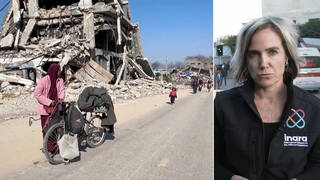Hi there,
In coming days Democracy Now! will continue to bring you post-election results and in-depth analysis on on the impact of the coming Trump administration. Because Democracy Now! does not accept corporate advertising or sponsorship revenue, we rely on viewers like you to feature voices and analysis you won’t get anywhere else. Can you donate $15 to Democracy Now! today to support our post-election coverage? Right now, a generous donor will DOUBLE your gift, which means your $15 donation is worth $30. Please help us air in-depth, substantive coverage of the outcome of the election and what it means for our collective future. Thank you so much! Every dollar makes a difference.
-Amy Goodman
Hi there,
In coming days Democracy Now! will continue to bring you post-election results and in-depth analysis on on the impact of the coming Trump administration. Because Democracy Now! does not accept corporate advertising or sponsorship revenue, we rely on viewers like you to feature voices and analysis you won’t get anywhere else. Can you donate $15 to Democracy Now! today to support our post-election coverage? Right now, a generous donor will DOUBLE your gift, which means your $15 donation is worth $30. Please help us air in-depth, substantive coverage of the outcome of the election and what it means for our collective future. Thank you so much! Every dollar makes a difference.
-Amy Goodman
Non-commercial news needs your support.
We rely on contributions from you, our viewers and listeners to do our work. If you visit us daily or weekly or even just once a month, now is a great time to make your monthly contribution.
Please do your part today.
HeadlinesJune 14, 2021
New Israeli Gov’t Coalition Ousts Benjamin Netanyahu After 12 Years as Prime Minister
Benjamin Netanyahu is out after 12 years as Israel’s prime minister. On Sunday, lawmakers approved a new coalition government and swore in far-right nationalist Naftali Bennett as its leader. If their coalition holds, Bennett will be succeeded as prime minister after two years by Yair Lapid, who first will serve as foreign minister. Eight separate parties from across the political spectrum form the new government, including the Arab List, which represents Palestinian citizens of Israel. Netanhayu, who is still in the middle of a corruption trial, vowed to return to power with his Likud party.
Benjamin Netanyahu: “We’ll be back soon. We’ll be back.”
Following the news of Netanyahu’s ouster, celebrations broke out in Tel Aviv. But Palestinians remained skeptical of the new government and its hard-line ultranationalist leader. This is Wasel Abu Yousef of the Palestine Liberation Organization.
Wasel Abu Yousef: “This extreme right-wing government, which includes extreme parties, will not bring other than more escalation against Palestinians and bloodshed. Palestinian blood will be the fuel for this extreme-right government, therefore this government will not differ from Netanyahu’s government.”
G7 Concludes as Activists Slam Failure to Act on Climate Crisis, Vaccine Inequality
The G7 summit concluded in Cornwall, England, on Sunday. As thousands of activists and protesters descended on the coastal town, world leaders failed to set firm goals on ending the use of coal and other measures to slow down the climate catastrophe. G7 members did agree on some funding goals to help the pivot away from fossil fuels and recommitted to a pledge of $100 billion a year for poorer countries dealing with the climate crisis. On the pandemic front, members called for another investigation into the origins of COVID-19 and committed to a series of actions to help prevent future pandemics. G7 leaders agreed to donate a collective 1 billion vaccine doses to less wealthy nations, but the World Health Organization and others have said 11 billion doses are needed to achieve global vaccination goals. G7 leaders also endorsed a U.S.-led plan to impose a minimum global corporate tax rate of 15% and unveiled a major infrastructure plan designed to counter China’s power and its multitrillion-dollar Belt and Road Initiative. This is Oxfam’s Max Lawson.
Max Lawson: “I think never before in the history of the G7 has there been such a big failure in contrast to what needs to be done. You know, we have a once-in-a-century pandemic, absolutely unprecedented. We have nine years to save the planet. It’s really hard to exaggerate the scale of what needs to be done.”
Biden to Meet with Turkey’s President Erdogan as NATO Summit Kicks Off
President Biden is now in Brussels for the NATO summit, where he is meeting today with Turkish President Recep Tayyip Erdogan. Later this week, Biden will meet with Russian President Vladimir Putin in Geneva. Biden spoke from Brussels earlier today.
President Joe Biden: “There is a growing recognition over the last couple years that we have new challenges. And we have Russia that is not acting in a way that is consistent with what we had hoped, and as well as China.”
Novavax Vaccine 90% Effective; U.S. COVID Cases Continue to Fall as California Readies for Reopening
A study has shown Novavax’s COVID-19 vaccine to be 90% effective. The Maryland-based Novavax is seeking approval from a half-dozen countries starting next month and has pledged over a billion doses to poorer nations through the COVAX mechanism. The two-shot vaccine is easily manufactured and can be stored in just a refrigerator. Vaccinated people were found to be completely protected against both severe and moderate illness.
COVID cases and deaths continue to fall in the U.S., with just 2% of tests coming back positive now. California is set to fully reopen Tuesday after over a year of restrictions.
A federal judge has dismissed a lawsuit by Houston hospital employees who refused to comply with their employer’s vaccine requirement in the first federal ruling on vaccine mandates.
U.K. Delays Reopening as Moscow Sees New Surge in Cases; India Moves to Reopen as Infections Drop
Officials in the United Kingdom are delaying the country’s reopening for another four weeks to enable more people to get vaccinated amid a rise in cases linked to the Delta coronavirus variant.
In Russia, the mayor of Moscow has ordered nonessential workers to stay home this week as the city registered a six-month high in cases.
Meanwhile, in India, many areas are relaxing coronavirus restrictions, including in the capital New Delhi, as new cases drop after the devastating spring surge. Experts are warning against a premature reopening, though, as just 5% of the adult population has been fully vaccinated.
Bombs Kill at Least 7 in Afghanistan as Hazara Shia Come Under Mounting Attacks
In Afghanistan, two separate bomb blasts killed at least seven people and wounded six others in the capital Kabul on Saturday. The explosions hit vehicles on a stretch of road in a neighborhood that’s mostly populated by members of the minority Hazara Shia community. Similar attacks by a local ISIS affiliate in recent weeks have killed scores of people, including nearly 100 people — most of them Hazara girls — killed in an attack on a Kabul school on May 8.
Shelling in Afrin, Syria, Kills at Least 13 People
In Syria, at least 13 people were killed and nearly two dozen others wounded Saturday as artillery shells hit a residential area and a hospital in the rebel-held city of Afrin. Among the dead were three hospital staff, a doctor, two women and two children. It’s not clear who launched the attack from Syria’s northern Aleppo province, which came from an area where both Syrian government troops and Kurdish-led fighters are active.
Tunisian Protesters Call for an End to Police Brutality After Recent Killings of Civilians
In Tunisia, hundreds of protesters clashed with police in working-class neighborhoods of the capital Tunis on Saturday, capping days of demonstrations demanding an end to police brutality. The protests erupted after video emerged showing police officers in civilian clothes stripping and viciously beating a young man. That incident came just a day after the funeral of another man who, his family says, was beaten to death by police. Protesters say Tunisia has yet to see meaningful police reform 10 years after the revolution that toppled longtime dictator Zine El Abidine Ben Ali.
Israeli Forces Killed 5 People in the Occupied West Bank Over Past Week, Including a 15-Year-Old Boy
In the occupied West Bank, a 15-year-old boy, Mohammad Said Hamayel, was shot and killed by Israeli forces Friday during a protest against an illegal Jewish settlement. At least six others were injured as soldiers fired live rounds, tear gas and rubber bullets at the protesters. On Saturday, an Israeli security guard shot dead a Palestinian woman at a checkpoint. The woman was identified as 28-year-old Ibtissam Kaabneh and was at least the fifth Palestinian to be killed by Israeli security forces in the West Bank over the past week.
Nigerians Protest on Democracy Day After Deadly Raid in Zamfara Kills at Least 53 People
In Nigeria, gunmen on motorcycles have raided several villages in the northern state of Zamfara, stealing cattle, attacking farmers and running down anyone attempting to flee. Residents said at least 53 people were killed in the assaults on Thursday and Friday.
Elsewhere in Nigeria, police fired their guns into the air and shot tear gas at anti-government protesters who rallied in Lagos, Abuja and other cities on Saturday. The protesters were denouncing rising insecurity and economic policies that have left one-third of Nigerians unemployed. Police were seen smashing the cellphones of protesters who were denouncing a ban on Twitter by President Muhammadu Buhari. This is a protester in Lagos.
Samson Okafor: “We cannot continue like this. You want to stop us not to protest for our rights. We must protest for our rights. This is our rights. Revolution must start from today. So, all this killing must stop. All this bad government must stop. Buhari, we don’t need you again.”
The protests came on Democracy Day, a national holiday marking the date in 1999 Nigeria’s military dictatorship ceded power to a civilian government.
Fire at New Delhi Rohingya Refugee Camps Leaves Hundreds Without Shelter
In India, a massive fire destroyed a Rohingya refugee camp in the capital New Delhi, leaving hundreds without homes. No casualties were reported. Some 40,000 Rohingya refugees live in camps across India, but the Hindu nationalist government has been arresting and threatening to deport members of the persecuted community. Some refugees from the burned camp say the blaze may have been an act of arson.
Calls for Justice in Guatemala After Two Trans Activists Killed
In Guatemala, transgender and human rights advocates are demanding justice for two trans women assaulted and killed in recent days. Twenty-eight-year-old Andrea González was shot to death in Guatemala City Friday. She was a leader of the organization OTRANS Queens of the Night, which denounced local media for dead-naming and misgendering González when reporting news of her killing. In a statement, OTRANS said, “The murder of our friend Andrea has hit us deep inside. We’ve lost a fighter, an undisputed leader.” Cecy Ixpata, also a member of Queens of the Night, died just days before González from injuries sustained in a separate attack.
Shootings Over Weekend Bring U.S. to More Than 270 Mass Shootings Since Start of 2021
Here in the U.S., it was another weekend marked by mass shootings, which set off manhunts in Savannah, Chicago and Austin. According to the Gun Violence Archive, the U.S. has seen over 270 mass shootings since the start of the year. At least nine people were killed in mass shootings this weekend alone.
AG Merrick Garland Says DOJ Will Work to Protect Voting Rights
Attorney General Merrick Garland on Friday announced new measures at the Justice Department to help protect voting rights.
Attorney General Merrick Garland: “Today I am announcing that within the next 30 days we will double the division’s enforcement staff for protecting the right to vote. … We are scrutinizing new laws that seek to curb voter access. And where we see violations, we will not hesitate to act. We are also scrutinizing current laws and practices in order to determine whether they discriminate against Black voters and other voters of color.”
At least 22 new laws restricting voting access have been passed in over a dozen states since the start of the year, as Republicans and conservative Democrats continue to block crucial voting rights bills from becoming law.
In other Justice Department news, Attorney General Garland is meeting with CNN, The New York Times and The Washington Post today to discuss the Trump administration seizing records from reporters as part of a sweeping probe into government leaks. On Sunday, reports emerged that Trump’s Justice Department also seized the records of top White House lawyer Don McGahn and his wife Shannon.
Louisiana ICE Jail Puts Prisoners on “Communications Lockdown” After Mishandling Tuberculosis Case
In Louisiana, an Immigration and Customs Enforcement jail has been put on a “communications lockdown” after imprisoned women led a protest in response to a possible exposure to tuberculosis and medical negligence. Women held at the South Louisiana ICE Processing Center in Basile revealed to The Intercept last week that a prisoner had reportedly tested positive for tuberculosis and that guards had ordered a quarantine. The women refused to comply, protesting the conditions inside the ICE jail. In retaliation, guards took away their phones and tablets so they wouldn’t be able to communicate with the outside world. Last year the jail took similar measures against women who spoke out against its response to the pandemic.
In other immigration news, in New Jersey, activists who successfully halted the deportations of two ICE prisoners earlier this month by protesting outside the Bergen County Jail are now facing rioting charges.
Record Temperatures Hit Southwest as Drought Conditions Worsen Across Western U.S.
Record heat is set to grip the Southwest this week, with excessive heat warnings issued in at least eight states and temperatures soaring to more than 120 degrees in some areas. The extreme heat is likely to exacerbate wildfire risks and the ongoing drought, which now affects over a quarter of the western United States. Nearly 2 million people in Northern California are under a water shortage emergency. Utah Governor Spencer Cox recently called on his state’s residents to pray for rain. In southern Oregon, water supply from the Klamath Basin was shut down to protect native fish species, leading some farmers to threaten to release water by force.
Pulitzer Prize Honors Darnella Frazier; Les and Tamara Payne Win for Malcolm X Biography
The Pulitzer Prize Board has awarded a special citation to Darnella Frazier, the teen who recorded the police murder of George Floyd last May on her cellphone. Frazier was just 17 years old when she made the recording that would go viral and trigger mass, global protests for racial justice. The footage was also used as evidence in the trial of convicted murderer and former Minneapolis police officer Derek Chauvin. The Pulitzer Board also commended Frazier for “highlighting the crucial role of citizens in journalists’ quest for truth and justice.”
Acclaimed late journalist Les Payne and daughter Tamara were awarded a Pulitzer for their book “The Dead Are Arising: The Life of Malcolm X.” Les Payne died in 2018 of a sudden heart attack while working on the biography, which his daughter later finished. Democracy Now! spoke to Tamara Payne about “The Dead Are Arising” in December.
Tamara Payne: “What he learned — and he’s a journalist to his core — he learned that there’s a lot about Malcolm that we don’t know, his family life. Who is this person? Malcolm is presented to us fully formed and angry. But that’s not what happened. You know, he has a family. He has lineage. And who was — where was that coming from? And also, what was this world that Malcolm was born into?”
Most popular
- 1
- 2
- 3
- 4
Non-commercial news needs your support
Please do your part today.











Media Options